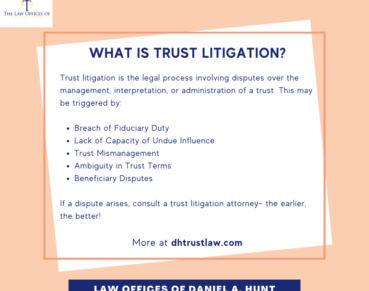Common Questions about Litigating a Last Will and Testament
The will contest surrounding the estate of famous singer Aretha Franklin demonstrates just how complicated litigation regarding a last will and testament can be. Initially, Aretha Franklin’s family members thought she died without a will. Nine months later, a family member found a few handwritten documents. In total, two or even three wills were believed to be found in her home.
As a result, Franklin’s four sons have an ongoing dispute over how her estate should be managed and divided. In March 2021, another document emerged that could be yet another will. Litigation surrounding her estate could go on for months, if not years. Will contests can be challenging and financially and emotionally draining. Let’s discuss some of the common questions about litigating a last will and testament.
Who Can Start a Will Contest?
Not everyone can challenge someone else’s last will and testament. Only interested parties can petition the probate court to contest the will. Individuals who would have inherited under the will or would be eligible to inherit under California intestacy laws have a right to contest the will.
If you are a beneficiary who will receive less of the estate under the alleged will than you would under a previous will, you can bring a will contest. Likewise, if you are an heir who would receive more money if there was no valid will, you can contest the will.
How Do I Start a Will Contest?
If you would like to challenge a last will and testament, your first step should be to discuss your case with an experienced estate litigation lawyer. At the Law Offices of Daniel A. Hunt, all of our lawyers are familiar with California will and probate laws. We will carefully consider your case and advise you of the best legal strategy to challenge the will.
Trying to figure out the legal procedure for contesting a will on your own leads to mistakes early on that could result in you losing the will contest. We will help you understand the process and advocate for you throughout it.
What are the Requirements for a Valid Will in California?
Under California law, a last will and testament is only valid when it meets the proper formalities. The will must be properly executed by a person who has the mental capacity to understand what he or she is signing. It must be witnessed according to California law, and it must be in writing. In some limited circumstances, holographic wills that are written in the testator’s hand are legally valid.
What are the Grounds for Contesting a Will?
Most contests that end up in litigation can be categorized into four different situations, described below. However, a will contest in California can involve one or more of the following issues:
- Lack of proper execution formalities
- Lack of testamentary capacity
- Undue influence
- Duress
- Fraud
- Mistake
- Revocation
First, the person challenging the will may claim that the will was not properly executed. They may assert the testator did not sign the will or sign the will without the necessary formalities, such as in front of the required witness or notary.
In other cases, the person challenging the will may claim that the testator who wrote the will did not understand what was happening, lacked the mental capacity to sign the will, or was mistaken or delusional about who the natural objects of their bounty were or should be. Someone challenging the will could claim that another person exerted undue influence over the testator to make a change or bequest for their personal gain.
Finally, the person challenging the will may claim that the probate court should enforce a subsequent will created at a later date. This is the scenario that occurred when the probate court attempted to execute Aretha Franklin’s will. Multiple wills that may have been drafted after the initial will have surfaced. A family member who would benefit more if the court enforces a later will is challenging the initial will.
How Do I Prove Undue Influence in California?
Do you suspect that someone used undue influence to pressure your loved one to cut you out of the will? If so, you have the right to contest the will. Under California law, a will is not valid if the testator was unduly influenced to sign the document.
To succeed in challenging the will, you must prove several elements using the evidence you submit to the probate court. You will need to prove that the testator did not have mental capacity at the time he or she made the will by establishing either of the following:
- The testator did not have sufficient mental capacity to be able to understand the nature of the testamentary act, understand and recollect the nature and situation of their property, or remember and understand their relationship to living descendants, spouse, and parents, and those whose interests are affected by the will.
- The individual suffered from a mental health disorder that was severe enough to render them incapacitated.
What Mental Health Disorders Qualify as Severe Enough?
Not all mental health disorders will be severe enough to prove that the testator lacked mental capacity when creating the will. You will need to provide evidence that the testator had symptoms such as hallucinations or delusions. The hallucinations or delusions must have caused the testator to divide property in a way that he or she typically would not have done without the hallucinations or delusions. If the testator had been diagnosed with dementia, Alzheimer’s disease, or psychosis, the diagnosis may be enough to establish mental incompetence.
Discuss Your Case With a Sacramento Will Contest Lawyer Today
Do you have questions about contesting a will? Are you considering contesting a friend or loved one’s will? Alternatively, is someone else challenging a will under which you will inherit property? If so, the Law Offices of Daniel A. Hunt is here to help. Contact our office today to schedule your initial consultation.
Law Offices of Daniel A. Hunt
The Law Offices of Daniel A. Hunt is a California law firm specializing in Estate Planning; Trust Administration & Litigation; Probate; and Conservatorships. We've helped over 10,000 clients find peace of mind. We serve clients throughout the greater Sacramento region and the state of California.




